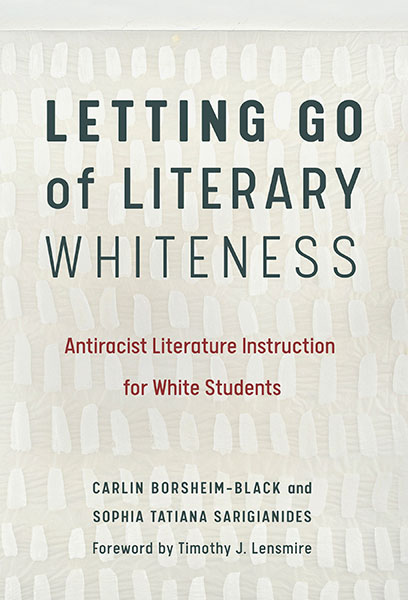Professors: Request an Exam Copy
Print copies available for US orders only. For orders outside the US, see our international distributors.
Carlin Borsheim-Black, Sophia Tatiana Sarigianides
Foreword by: Timothy J. Lensmire
Publication Date: September 6, 2019
Pages: 160
Series: Language and Literacy Series

Rooted in examples from their own and others’ classrooms, the authors offer discipline-specific practices for implementing antiracist literature instruction in White-dominant schools. Each chapter explores a key dimension of antiracist literature teaching and learning, including designing literature-based units that emphasize racial literacy, selecting literature that highlights voices of color, analyzing Whiteness in canonical literature, examining texts through a critical race lens, managing challenges of race talk, and designing formative assessments for racial literacy and identity growth.
Book Features:
Carlin Borsheim-Black is associate professor of English Education at Central Michigan University. Sophia Tatiana Sarigianides is professor of English Education at Westfield State University.
“An important resource for White English teachers looking to racialize the canonical texts in majority White environments.”
—Education Review
" Letting Go of Literary Whiteness is an important and accessible text that pulls no punches while drawing examples from the authors’ own practice to squarely address ways to implement antiracist literature instruction in all classrooms, with particular attention to the challenges of antiracist literature teaching in White-dominant schools."
—Teachers College Record
”Using the experiences of ‘real teachers in real classrooms,’ Borsheim-Black and Sarigianides offer theoretically grounded practical examples of and approaches to teaching texts in ways that center critical close reading, student voice, difficult discussions, and the construction and maintenance of race in the canon and society.”
—Journal of Language and Literacy Education
“In Letting Go of Literary Whiteness, Carlin Borsheim-Black and Sophia Tatiana Sarigianides explore pathways for developing educators’ racial consciousness by interrogating literary works through the lens of critical race theory.”
—English Education
“Letting Go of Literary Whiteness unpacks the necessary responsibility of exploring race for all teachers. Borsheim-Black and Sarigianides center this work in English classrooms, exploring the kinds of literature, discussions, and difficult instructional decisions that teachers make every day. This book emphasizes that racial justice is a shared responsibility for teachers today and, through myriad practical examples, offers guidance for centering equity in schools.“
—Antero Garcia, Stanford Graduate School of Education
“Borsheim-Black and Sarigianides challenge us to develop racial literacy in our students through the teaching of literature. Their book offers practical examples of employing a critical race perspective with commonly taught canonical texts in ways that foster close reading, student voice, and an awareness of the role that race plays in our literary canon and our country. I hope that our nation’s teachers have the courage to read this book.”
—Ernest Morrell, University of Notre Dame
"The magic of this book is that it makes clear that there is no magic required for teaching about racism with literature in White schools. What’s required is a desire for something better and a lot of hard, smart work."
—From the Foreword by Timothy J. Lensmire, University of Minnesota
Contents
Foreword Timothy J. Lensmire ix
Acknowledgments xi
1. Teaching About Racism Through Literature in White Schools 1
Why Focus on White Educational Contexts? 3
Why Teach About Racism via Literary Study? 6
What Is Antiracist Literature Instruction and Why Take It Up? 10
Notes on Authorial Decisions 12
2. Designing Racial Literacy Objectives and Assessments for Literature-Based Units 15
Common Challenge: Glossing Over Complex Race Concepts 15
Why This Matters from an Antiracist Perspective 17
What You Can Do: Use Backward Planning to Design Literature Units for Racial Literacy 19
In the Classroom: Articulating Racial Literacy Objectives for A Raisin in the Sun 26
Conclusion 32
3. Introducing a Racialized Reader Response 33
Common Challenge: White Readers’ Misreadings of Blackness in Literature 33
Why This Matters from an Antiracist Perspective 34
What You Can Do: Interrupt Whiteness via Text Selection and Literary Response 42
In the Classroom: Racializing White Readers’ Responses to The Crossover 48
Conclusion 50
4. Unearthing Whiteness in Canonical Texts About Racism 51
Common Challenge: White Investments in Canonical White Savior Narratives 51
Why This Matters from an Antiracist Perspective 52
What You Can Do: Expose Whiteness in Canonical, White-Authored Texts 56
In the Classroom: Exposing Whiteness in Adventures of Huckleberry Finn 59
Conclusion 71
5. Applying a Critical Race Theory Lens to Literary Analysis 72
Common Challenge: Reinforcing Racism via Traditional Literary Analysis 72
Why This Matters from an Antiracist Perspective 73
What You Can Do: Apply a CRT Lens to Literary Analysis 74
In the Classroom: Applying a CRT Lens to To Kill a Mockingbird 79
CRT Analysis of One Crazy Summer 85
Conclusion 85
6. Planning for and Responding to Race Talk 88
Common Challenge: Managing Race Talk 89
Why This Matters from an Antiracist Perspective 91
What You Can Do: Use Proactive and Reactive Strategies for Managing Race Talk 93
Conclusion 106
7. Designing Assignments to Build Racial Literacy 107
Common Challenge: Questioning White Racial Assumptions 107
Why This Matters from an Antiracist Perspective 108
What You Can Do: Design Assignments to Scaffold Racial Literacy 109
In the Classroom: Using Collaborative Glossaries and Exploratory Essays 110
Racial Identity Work for White Teachers 119
A Beginning, Not an End 122
References 123
Index 133
About the Authors 145
2022 AACTE Outstanding Book Award
Professors: Request an Exam Copy
Print copies available for US orders only. For orders outside the US, see our international distributors.